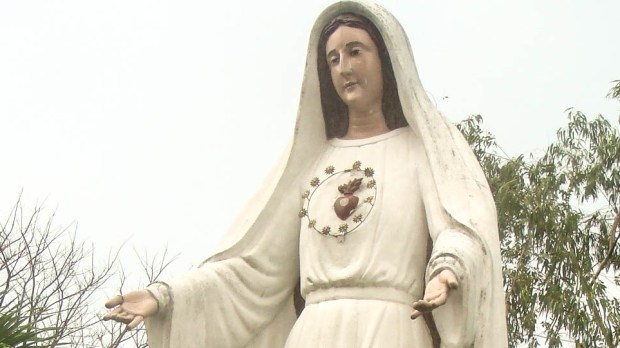Lenten Campaign 2025
This content is free of charge, as are all our articles.
Support us with a donation that is tax-deductible and enable us to continue to reach millions of readers.
Some years ago, I had my 3-year-old nephew John Paul with me at Mass. After we came back from Communion, I knelt beside him and whispered, “John Paul, I have Jesus in my tummy!” He looked at me sternly and corrected me: “Aunt Meg is not pregnant.”
Given that his mother and his only other aunt were both pregnant at the time, I suppose his response was reasonable. He’d probably asked his mother several times if I was pregnant along with the other women in the family and been informed in no uncertain terms that his single aunt wasn’t expecting. And what else could it mean to have someone in your tummy but that you were pregnant?
I explained to him later what I had meant: that the same Jesus who he saw lifted up above the altar by the priest, the same Jesus who I received on my tongue, the same Jesus who had been born in Bethlehem and lived in Galilee and died and rose in Jerusalem, that same Jesus was transforming me from within.
Because kids are marvelous, this made sense to him and he moved on happily to whatever book he was obsessed with that week. But I kept thinking about it: no, I wasn’t pregnant with Jesus. But he was just as present in me as he was in Our Lady when she was pregnant.
When Mary conceived the Son of God in her womb, it was, in a sense, the world’s first Communion. It was the first time God had dwelt in the body of a creature. And each time I receive him, he dwells in me the same way.
But when Mary became the Mother of God, everything about her radiated his presence. John the Baptist leapt in his mother’s womb when Mary approached, while Elizabeth was filled with the Holy Spirit and rejoiced in God’s presence in Mary’s womb. Though Mary had always been without sin, now she was a beacon of grace, a vessel bringing Christ to everyone she met.
Why is it different for me?
Oh, his presence remained in her for nine months while in me it’s numbered in minutes. And she had the moderate advantage of having been conceived without Original Sin. But both of us have received God in his fullness into our bodies. Both of us have experienced the unutterable intimacy of being one with him.
Mary is called the Mother of the Eucharist because the Eucharist we receive at every Mass is the same substance that she held in her womb, that she held in her lap, that she held in her arms at the foot of the Cross. And through the gift of the Blessed Sacrament, you and I are invited to partake in the mystery she lived: to be so intimately connected with Jesus that we can hardly tell where we leave off and he begins.
Mary is given to us not just to be our mother but to show us what it is to follow Jesus. Nobody loved him more perfectly, nobody served him more fully. In all things, we look to Mary as the model of all believers. But with the Eucharist particularly, Mary’s example can transform us.
When we stare at the Eucharist in the monstrance, he doesn’t look like God any more than the wrinkly, pink infant in the feed trough looked like God. With Mary, we choose to believe what we have been told. We choose to worship.
Just as Jesus’ presence in Mary transformed her body, his presence in us should transform our lives. Our tongues that taste the body of Christ should never become weapons but should speak the truth in love. Our hearts that pump his blood should bleed for the pain of the world. If nothing else, the moments after we receive should draw our hearts to ponder his presence within us, as Mary must have during those nine months when the God of the universe was contained in her womb.
After Jesus had ascended into heaven, Mary remained with the Apostles, gathered with them for “the breaking of the bread and the prayers” (Acts 2:42). And when they held the host up in the air, Mary saw her Son. It may have made her long to meet him in heaven more than it satisfied her aching heart, but she rejoiced to be near him, just as she had in his infancy and his adolescence and his public ministry and his death.
This Corpus Christi Sunday, let’s ask the Mother of the Eucharist to give us hearts like hers, that though we will never be pregnant with the Son of God, we may worship and serve and proclaim him in the Eucharist just as she did.

